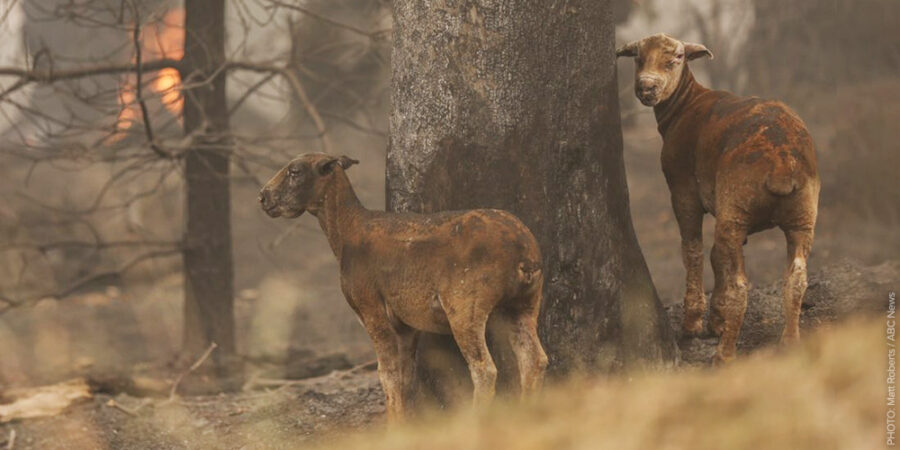Paul ‘got’ that at a heart level we don’t discriminate in how we feel about animals — which is why animal food industries have gone to such lengths to ‘keep the blinds down’.
The more hidden that farmed animals became from the community — whether in factory farms, large outback properties or in slaughterhouses — the easier it became to maintain the laws that allow them to be treated cruelly.
Even the language that is used around farmed animals serves to separate our hearts and minds and convince us that they are ‘commodities’ rather than sentient beings. Think ‘livestock’ for example. Cattle ‘producers’ is another.
The language being used by industry representatives around the suffering and deaths of up to 10 million sheep and cattle in the recent fires provided insights into generations of mental programming.
There is no doubt that farmers would have been traumatised by witnessing the animal suffering and felt compassion for the animals they were unable to protect — but industry representatives chose to speak to the commercial implications rather than these animals also being tragic victims of a natural disaster.
“Probably one of the saddest parts, I think, for a lot of the producers, will be to lose their lines and the genetics that they will have been working on for a long time.” — Paul Martin, Saleyard Manager
Why wouldn’t animal industry representatives have spoken to the farmers empathy for these animals? Because traditionally the language that is used around farmed animals assists to depersonalise them and maintain emotional separation. After all, these animals are raised to be slaughtered — opening one’s heart to them comes with all sorts of complexities and implications.
But it’s time to realise that so do laws that allow cruel practices to be inflicted on farmed animals. Inflicting excruciatingly painful practices without pain relief — such as dehorning, mulesing, spaying, debeaking, tail cutting/docking or severely caging animals and denying them quality of life — impact both humans and animals. Legally permitting these cruel practices force those who work in these industries to quieten their conscience and quell their compassion when it is the most noble and needed of human virtues.
When harrowing images from the recent fires of the bodies of sheep lining barbed wire fences, of cattle with burnt feet so painful they can no longer stand, were published by the media — not language, nor conditioned thinking, not discriminating laws, could hold at bay the compassion and distress felt for them. All of the mental programming that causes us to think about them differently dissolved. We all simply wished we had been able to protect them from harm.










